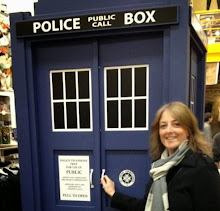Friday, May 11, 2007
Cops want covert cameras in public places
 Police in Victoria, British Columbia want to install security cameras in public areas around the provincial capital in a bid to fight crime and reduce vandalism. I wrote an earlier post about the plethora of surveillance cameras in public areas and motorways in the United Kingdom and the concern that this was creating a “surveillance society” there.
Police in Victoria, British Columbia want to install security cameras in public areas around the provincial capital in a bid to fight crime and reduce vandalism. I wrote an earlier post about the plethora of surveillance cameras in public areas and motorways in the United Kingdom and the concern that this was creating a “surveillance society” there.What’s different about the Victoria proposal is that while cameras in the U.K are visible to the public, police in Victoria want the cameras to be hidden. The rationale for hiding the cameras from public view is unclear. Visible cameras are designed to serve as a deterrent to crime, with the criticism that they only serve to move crime along to other areas. Hidden cameras are designed to catch criminals in the act, and could be argued to have a wider impact in deterring crime, as no one knows for sure where the cameras are located and when they are being watched.
Meanwhile, in a six-month pilot project, police in Toronto are extending the use of visible closed-circuit cameras from the downtown into residential areas with high crime.
"Wherever the analysis tells us that violence is likely to take place...those
are the areas we will use the technology," said police chief, Bill Blair.
Back in the U.K, police are building on their massive network of fixed cameras, by carrying camcorders with them on the beat in an increased effort to cut crime and reduce "anti-social behaviour. "
Sgt Craig Donald, of the INA's Safer Community Team, said: "Equipping officers with hand-held cameras has had great success elsewhere with reductions in anti-social behaviour and crime being recorded.
"It's a very effective way to secure evidence to support a prosecution and it's certainly a deterrent as people don't usually want to commit a crime if they think there is a chance they could be identified at a later stage."
The reactions from citizens in every jurisdiction where police surveillance cameras are being used is inevitably mixed. Some support the cameras as they believe they will improve social order and reduce crime, and besides, they’re not doing anything wrong. Others object to the intrusion into their privacy and how the very presence of the cameras may alter their decisions. When cameras are visible, people can at least choose to avoid them. Hidden cameras have a greater chilling effect on the average citizen, as they never know when or where they could be filmed.
What if you’re a gay man who regularly attends a local gay bar? Or, you are a concerned citizen who wants to participate in public protest rally against a police or government decision? Or, you’re seeking medical attention and you don’t want anyone to know about it? Would the presence of visible security cameras, or the threat of being monitored by hidden cameras make you think twice before participating in any of these lawful activities?
While the evidence to support the claims that cameras reduce crime is in dispute, the use of this surveillance technology by police is here to stay and citizens need to be informed about how and why it is being used. Police must be held to the highest standard of accountability to ensure transparency and to ensure that privacy laws are not violated. In our efforts to reduce crime and improve social order, we should not trade away our rights to privacy and to participate fully in society without fear.
So, as you go about your business today - do you really know if you’re being watched?
Posted by Sharon E. Herbert at Friday, May 11, 2007
Labels: Anonymity, British Columbia, Free speech, Ontario, Policing, Privacy, Surveillance, United Kingdom





4 comments:
This is more than a little scary. The British are trialling a not so covert CCTV system:
http://news.bbc.co.uk/2/hi/uk_news/england/tees/5353538.stm
Interesting topic but you can expect the environment to continue to change with more and more importance being placed on security. I am not opposed but understand the concerns around having camera's in the watchful corner.
Thanks for your comments Johno and Stephen. You are right, Stephen, surveillance technologies will become more prevalent in our society. Hopefully we will ensure some accountability in the way it will be used.
I continue to write a series on personal privacy and just referenced this post.
Post a Comment